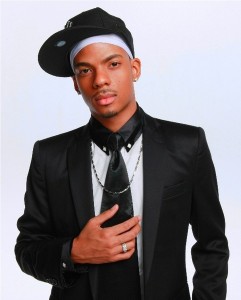
"Every chance I get, I would like to perform. I feel that in order to keep this genre of music alive, the younger generation of Japan needs to be exposed to it more often. I am happy that I am able to keep my current younger fans and gain new ones." (Guan Barl)
By JQ magazine editor Justin Tedaldi (CIR Kobe-shi, 2001-02) for Examiner.com. Visit his Japanese culture page here for related stories.
Since becoming a star in Japan in 2008 for his interpretations of enka, or Japanese ballads, singer Jero is now poised to make his New York debut at Japan Society on June 9 withLet’s Enka! with Jero, where he will perform a selection of karaoke-accompanied enka classics and talk about his childhood, his trailblazing success, the challenges he’s faced and his love for the uniquely Japanese genre of music.
Born Jerome Charles White, Jr., the 30-year-old Pittsburgh native was born of mixed Japanese and African American heritage. He was exposed to enka and the Japanese language as a child by his grandmother, a native of Yokohama. Jero’s first single released in Japan, “Umiyuki” (“Ocean Snow”), entered the top five of the national pop charts, which helped the fledgling vocalist win Best New Artist of 2008 at The 50th Annual Japan Record Awards.
Following his Japan Society debut concert, Jero will participate in a rare meet-and-greet with fans, selling and signing his CDs as well as special Jero tote bags, the proceeds of which will be donated to JERF, the Japan Earthquake Relief Fund, set up by Japan Society in the wake of 3/11. In this exclusive interview, I caught up with Jero on his difficult pre-stardom days in Japan, the turning point that encouraged him to perform in America, and his role as a global envoy of enka.
Your New York debut will be held at Japan Society. How did this come together?
I received an e-mail for the event asking me to perform. I forwarded the e-mail to my manager and there you have it!
Tell us a little about your previous live performances in North America. What were your expectations and how were the shows received?
My very first performance in the U.S. [in 2008] was at my alma mater, the University of Pittsburgh. Two years later, I was given the opportunity to perform in L.A. and San Francisco. I actually was against performing in the U.S. because I wasn’t sure how it would be perceived by the U.S. audience, as all the songs are in Japanese. I received a lot of positive feedback after those performances, which gave me a confidence I never had before.
You’ve said before that you would like to keep performing on the Japanese New Year’s Eve music program Kohaku Uta Gassen every year and continue to get younger audiences listening to enka. How do you feel this has been going so far, and how do you feel about introducing enka to a younger generation of fans?
Every chance I get, I would like to perform. Because the enka audience has decreased every year, outlets to perform have also decreased. I feel that in order to keep this genre of music alive, the younger generation of Japan needs to be exposed to it more often. I am happy that I am able to keep my current younger fans and gain new ones.
For the complete story, click here.
Read an exclusive interview with Jero from the winter 2009 issue of JQ magazine here.


one comment so far...
Hail Pitt! Good to see a Pittburgher mail us proud. I like to tell everyone that Jero is my “kohai” : )